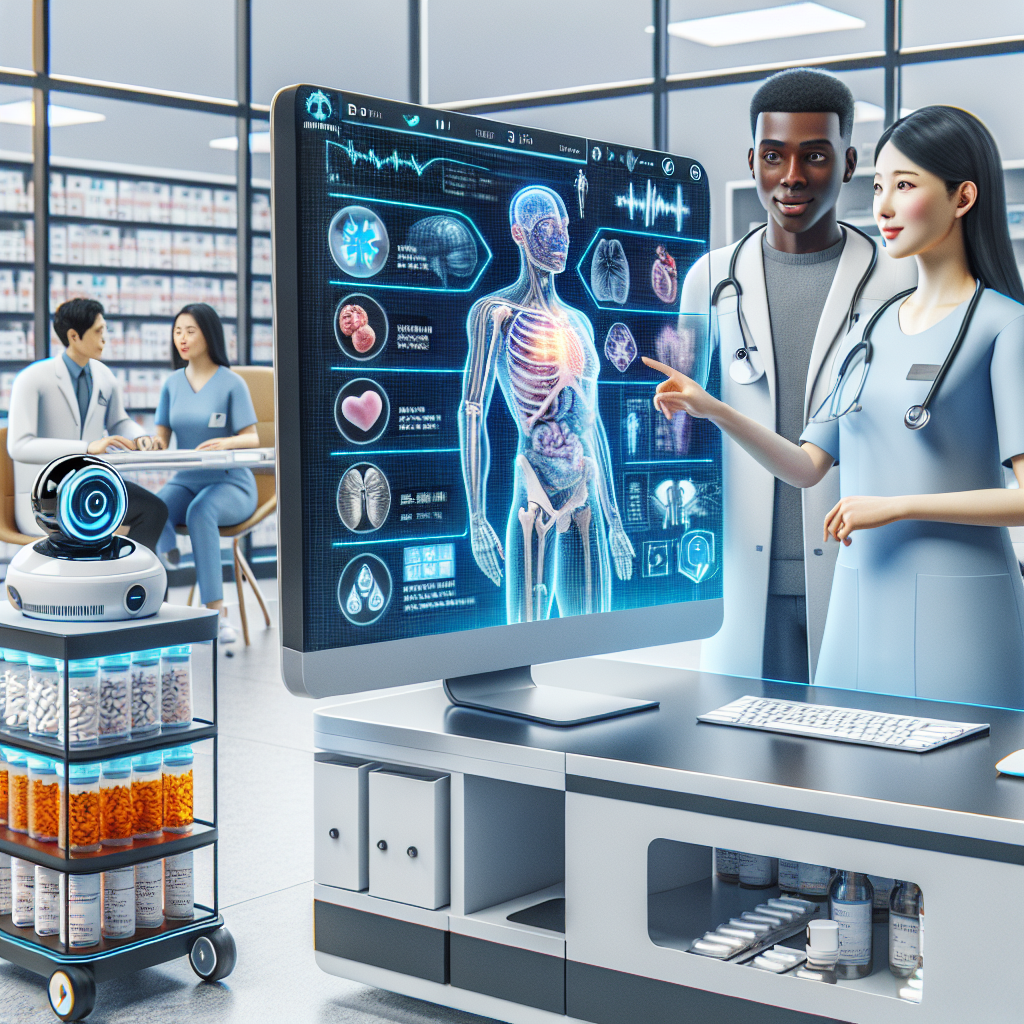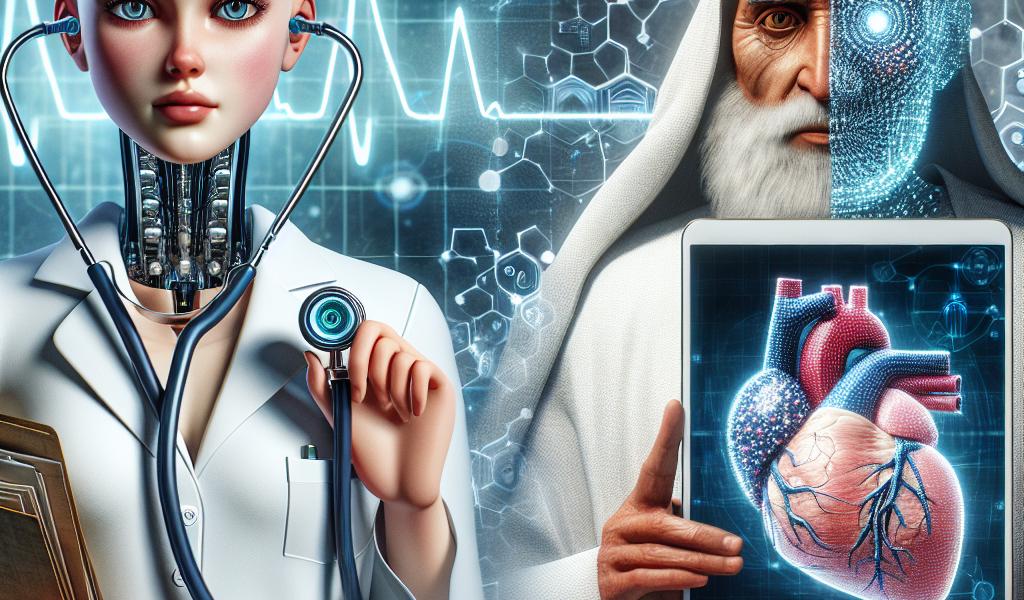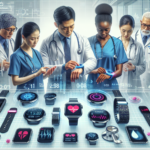-
Table of Contents
“Revolutionizing Care: AI’s Impact on Modern Healthcare”
Introduction

Artificial Intelligence (AI) is revolutionizing the healthcare industry by enhancing diagnostic accuracy, personalizing treatment plans, and streamlining administrative processes. AI-driven technologies, such as machine learning algorithms and natural language processing, enable the analysis of vast amounts of medical data, leading to early disease detection and more precise prognoses. Additionally, AI-powered tools assist in drug discovery, reducing the time and cost associated with bringing new medications to market. Robotic process automation (RPA) and AI chatbots improve patient engagement and operational efficiency, allowing healthcare providers to focus more on patient care. Overall, AI is poised to significantly improve healthcare outcomes, reduce costs, and increase accessibility to medical services.
Revolutionizing Diagnostics: AI’s Role in Early Disease Detection
Artificial intelligence (AI) is making waves across various sectors, but its impact on healthcare, particularly in the realm of diagnostics, is nothing short of revolutionary. The ability of AI to analyze vast amounts of data quickly and accurately is transforming how diseases are detected, often before symptoms even manifest. This early detection is crucial, as it can significantly improve patient outcomes and reduce healthcare costs.
One of the most promising applications of AI in diagnostics is in the field of medical imaging. Traditional methods of analyzing X-rays, MRIs, and CT scans rely heavily on the expertise of radiologists, who must meticulously examine each image for signs of abnormalities. However, AI algorithms can be trained to recognize patterns and anomalies in these images with remarkable precision. For instance, AI systems have demonstrated the ability to detect early signs of breast cancer in mammograms, sometimes even outperforming human radiologists. This not only speeds up the diagnostic process but also reduces the likelihood of human error.
Moreover, AI is proving to be a game-changer in the detection of diseases that are notoriously difficult to diagnose in their early stages. Take, for example, Alzheimer’s disease. Traditionally, diagnosing Alzheimer’s involves a combination of cognitive tests, medical history reviews, and brain imaging, often only confirming the disease once significant brain damage has occurred. However, AI algorithms can analyze brain scans and other biomarkers to identify early signs of Alzheimer’s, potentially years before symptoms appear. This early detection opens the door to interventions that could slow the progression of the disease, offering hope to millions of patients and their families.
In addition to imaging, AI is also making strides in the analysis of genetic data. The human genome is incredibly complex, and identifying genetic markers associated with specific diseases can be like finding a needle in a haystack. AI algorithms, however, can sift through this data at lightning speed, identifying patterns and correlations that might elude human researchers. This capability is particularly valuable in the field of oncology, where early detection of genetic mutations can lead to more personalized and effective treatment plans for cancer patients.
Furthermore, AI’s role in diagnostics extends beyond individual diseases to encompass broader public health challenges. For instance, during the COVID-19 pandemic, AI was employed to analyze data from various sources, including social media, travel records, and healthcare databases, to predict outbreaks and track the spread of the virus. This real-time analysis enabled public health officials to respond more swiftly and effectively, potentially saving countless lives.
Despite these advancements, it’s important to acknowledge the challenges and ethical considerations that come with integrating AI into healthcare. Ensuring the accuracy and reliability of AI algorithms is paramount, as is addressing concerns about data privacy and security. Additionally, there is the question of how to best integrate AI tools into existing healthcare workflows without overwhelming practitioners or compromising patient care.
Nevertheless, the potential benefits of AI in early disease detection are too significant to ignore. As technology continues to evolve, so too will the capabilities of AI, offering new and innovative ways to diagnose and treat diseases. By embracing these advancements, the healthcare industry can move towards a future where early detection and personalized treatment are the norms, ultimately improving the quality of life for patients around the world.
Personalized Treatment Plans: How AI Tailors Healthcare to Individual Needs
Artificial intelligence (AI) is revolutionizing the healthcare industry, and one of the most significant advancements is in the realm of personalized treatment plans. By leveraging vast amounts of data and sophisticated algorithms, AI is enabling healthcare providers to tailor treatments to the unique needs of individual patients, thereby improving outcomes and enhancing the overall patient experience.
To begin with, AI’s ability to analyze large datasets quickly and accurately is a game-changer. Traditional methods of diagnosing and treating illnesses often rely on generalized protocols that may not account for the nuances of each patient’s condition. However, AI can sift through electronic health records, genetic information, and even lifestyle data to identify patterns and correlations that might be missed by human practitioners. This comprehensive analysis allows for a more precise understanding of a patient’s health, paving the way for customized treatment plans.
Moreover, AI’s predictive capabilities are particularly beneficial in creating personalized healthcare strategies. By examining historical data and current health metrics, AI can forecast potential health issues before they become critical. For instance, machine learning algorithms can predict the likelihood of a patient developing chronic conditions such as diabetes or heart disease. Armed with this foresight, healthcare providers can implement preventive measures tailored to the individual’s risk factors, thereby mitigating the onset of these conditions.
In addition to predictive analytics, AI is also enhancing the personalization of treatment through its role in genomics. The field of genomics involves the study of an individual’s genes and their interactions with each other and the environment. AI can analyze genetic data to identify mutations and variations that may influence a patient’s response to certain medications or therapies. This information is invaluable in developing personalized treatment plans, as it allows for the selection of the most effective and least harmful interventions based on the patient’s genetic makeup.
Furthermore, AI-driven tools are making it easier for healthcare providers to monitor patients in real-time, ensuring that treatment plans are continuously optimized. Wearable devices and mobile health applications can collect data on a patient’s vital signs, activity levels, and other health indicators. AI algorithms can then analyze this data to detect any deviations from the norm and alert healthcare providers to potential issues. This real-time monitoring enables timely adjustments to treatment plans, ensuring that patients receive the most appropriate care at all times.
Another significant advantage of AI in personalized healthcare is its ability to facilitate patient engagement and education. AI-powered chatbots and virtual assistants can provide patients with personalized health information, reminders for medication adherence, and guidance on lifestyle changes. By empowering patients with knowledge and support, these tools help individuals take an active role in managing their health, which is crucial for the success of personalized treatment plans.
Despite the numerous benefits, it is important to acknowledge the challenges and ethical considerations associated with AI in healthcare. Data privacy and security are paramount, as the sensitive nature of health information necessitates stringent safeguards. Additionally, there is a need for transparency in AI algorithms to ensure that they are free from biases that could lead to disparities in care. Addressing these concerns is essential to fully realizing the potential of AI in personalized healthcare.
In conclusion, AI is transforming the healthcare industry by enabling the creation of personalized treatment plans that cater to the unique needs of individual patients. Through advanced data analysis, predictive analytics, genomics, real-time monitoring, and patient engagement tools, AI is enhancing the precision and effectiveness of healthcare. As the technology continues to evolve, it holds the promise of even greater advancements, ultimately leading to improved health outcomes and a more patient-centered approach to care.
Streamlining Administrative Tasks: AI’s Impact on Healthcare Efficiency
Artificial intelligence (AI) is revolutionizing various sectors, and the healthcare industry is no exception. One of the most significant impacts of AI in healthcare is its ability to streamline administrative tasks, thereby enhancing overall efficiency. This transformation is not only reducing the burden on healthcare professionals but also improving patient care and operational workflows.
To begin with, AI-powered systems are adept at handling routine administrative tasks that traditionally consume a considerable amount of time and resources. For instance, scheduling appointments, managing patient records, and processing insurance claims are now being automated through AI algorithms. These systems can analyze vast amounts of data quickly and accurately, ensuring that administrative processes are carried out with minimal human intervention. Consequently, healthcare staff can focus more on patient care rather than getting bogged down by paperwork.
Moreover, AI is playing a crucial role in optimizing resource allocation within healthcare facilities. By analyzing patterns and predicting patient inflow, AI can help hospitals and clinics better manage their resources, such as staff, equipment, and bed availability. This predictive capability ensures that healthcare providers are prepared for fluctuations in patient numbers, thereby reducing wait times and improving the overall patient experience. Additionally, AI-driven analytics can identify inefficiencies in current workflows, providing actionable insights to streamline operations further.
Transitioning to another significant aspect, AI is also enhancing the accuracy and efficiency of medical billing and coding. Traditionally, this process has been prone to human error, leading to claim denials and financial losses for healthcare providers. However, AI systems can accurately code medical procedures and diagnoses by analyzing clinical documentation and cross-referencing it with coding standards. This not only reduces errors but also speeds up the billing process, ensuring that healthcare providers receive timely reimbursements.
Furthermore, AI is transforming the way healthcare providers handle patient data. Electronic Health Records (EHRs) have become a standard in the industry, but managing these records can be cumbersome. AI-powered solutions can automatically update and organize EHRs, making it easier for healthcare professionals to access and interpret patient information. This seamless integration of AI with EHRs ensures that patient data is always up-to-date and readily available, facilitating better clinical decision-making.
In addition to these benefits, AI is also improving communication within healthcare organizations. Natural language processing (NLP) algorithms can transcribe and interpret clinical notes, enabling more effective communication between healthcare providers. This ensures that critical patient information is accurately conveyed, reducing the risk of miscommunication and enhancing collaborative care.
As we move forward, the integration of AI in healthcare administration is expected to grow even more sophisticated. Emerging technologies such as machine learning and deep learning are poised to bring about further advancements, making administrative tasks even more efficient and error-free. However, it is essential to address the challenges associated with AI implementation, such as data privacy concerns and the need for robust cybersecurity measures. Ensuring that AI systems are transparent and ethically designed will be crucial in gaining the trust of both healthcare professionals and patients.
In conclusion, AI is undeniably transforming the healthcare industry by streamlining administrative tasks and enhancing overall efficiency. From automating routine processes to optimizing resource allocation and improving data management, AI is making a significant impact. As technology continues to evolve, the potential for AI to further revolutionize healthcare administration is immense, promising a future where healthcare providers can deliver even better care with greater efficiency.
Conclusion
AI is revolutionizing the healthcare industry by enhancing diagnostic accuracy, personalizing treatment plans, and streamlining administrative processes. Advanced algorithms analyze vast datasets to identify patterns and predict patient outcomes, leading to early disease detection and more effective interventions. AI-driven tools, such as robotic surgery and virtual health assistants, improve patient care and operational efficiency. Additionally, AI facilitates drug discovery and development, accelerating the creation of new therapies. Overall, AI’s integration into healthcare promises improved patient outcomes, reduced costs, and a more efficient healthcare system.





